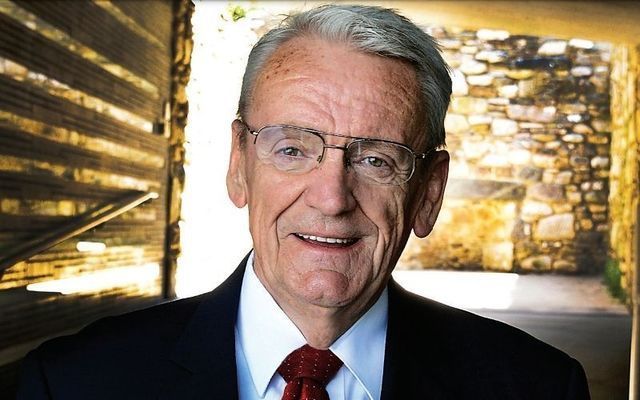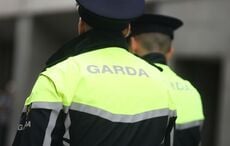The Adrian Flannelly Show, the longest-running Irish radio program in America, has ended its run after 54 years.
The permanent archives will be available at NYU Glucksman House in New York, a treasure trove for future historians.
Operating under the title Irish Network USA, the program was hosted for more than a half-century by the genial, Mayo-born Flannelly, later joined by executive producer Aine Sheridan.
The show carried immense power and commanded listener loyalty during its height, especially as a key player in securing 84,000 green cards known as the Morrison and Donnelly visas which took tens of thousands of undocumented Irish out of the shadows in the 1980s and 1990s. The visas allowed them to, at last, enjoy the freedom of living legally in America.
During that hectic period, the Adrian Flannelly Show served as the unofficial sorting office for Donnelly and Morrison visa applications, and the offices on Madison Avenue were piled to the rafters with boxes of applications from all over the globe which were delivered in person via a fleet of vans to the designated post office in Virginia.
Adrian’s show reached 2.5 million listeners nationwide at the height of the ‘80s and ‘90s. Many of the young undocumented Irish at the time can credit Flannelly for getting the word out to them coast to coast and across the globe.
Indeed, Flannelly and his wife Aine Sheridan, a native of Longford, have been at the center of every major Irish issue for decades. Around New York City’s mayoral election time, they became familiar figures with their endorsement eagerly sought.
Mayors like Ed Koch, Rudy Giuliani, David Dinkins, and especially Michael Bloomberg became strong advocates for Irish issues and used Flannelly as their wise counselor on all Irish affairs.
Bloomberg even went to Ireland on a historic visit at the urging of Adrian and Aine. Always one to share a story, Flannelly vividly recalls when former New York Governor George Pataki, another close friend, went to Mayo with Flannelly and an Irish contingent. He promptly fell into a bog hole, arriving at Ashford Castle caked in mud, but a good laugh was had by all.
Flannelly set in motion an Irish section of Catholic Charities when he and Monsignor James Murray created the Irish wing known as Project Irish Outreach of the New York Archdiocese to help many families of undocumented and young emigrants with problems.
His radio show was the first destination for leading Irish politicians and celebrities as well as for many community people who needed assistance with Irish projects. There was often no running order – you were likely to see some fellow selling tickets for the Mayo GAA on the air while Maureen O’Hara waited her turn to be interviewed. It was one for all as Adrian saw it.
He also played an important role in the American response to the Good Friday Agreement by giving a platform to every major political figure such as Gerry Adams, Martin McGuinness, David Trimble, and Bertie Ahern.
Flannelly, in conjunction with Pataki in August 2002, was the driving force behind the Irish Hunger Memorial in Battery Park in lower Manhattan, the unveiling of which was one of the biggest events for the Irish ever held in New York. Irish President Mary McAleese did the honors. Fittingly, the grass imported from Ireland was from Attymass, Adrian’s home village.
His radio show was also an opportunity for young Irish music acts to get a showcase. Flannelly was a skilled entertainer on piano and accordion himself, and storytelling is as natural to him as day follows night. He would either have ended up as a seanachai or a politician had he stayed in Ireland.
He was devoted to his uncle Paul O'Dwyer, the former New York City Council president and the most revered Irishman in the city during his political career. Brian O’Dwyer, Paul’s son and Adrian’s first cousin, was also a key figure in O’Dwyer and Bernstein, the law firm started by Paul in 1935 to defend the defenseless, advocate for those with no voice and see that justice was done for Irish people fleeing persecution in Northern Ireland.
Chief among its advocates was Frank Durkan, another Mayo man and Adrian’s cousin. Frank was a brilliant defense lawyer who surveyed the world wearing his perennial pork pie hat.
Talking about finishing his radio show, Flannelly said modestly, “Yes, we got a lot done”, but he warned the community still had a lot to do.
“We simply must have immigration from Ireland resumed at some point. We contributed so much and we deserve better than to have the golden door slammed in our face.”
He talked about how so many young Irish are heading for Australia these days and bemoans that so few can come to America. “Voluntary immigration to the U.S. created the greatest Irish community in the world,” he said. “We need that inward flow. America needs the Irish.”
Flannelly agrees his show was quite a ride and he wouldn’t have changed a thing. He could never have envisaged 50-plus years on the air when he started up a modest Irish hour in 1969.
Every week the song “O’Donnell Abu” would kick off the two-hour show and Flannelly was usually rushing into his studio as the music started, blaming the Manhattan traffic. But once on air, the show proceeded flawlessly. His listening audience made sure every program was widely discussed. There was plenty of controversy too with famed satirist and actor Malachy McCourt providing lots of guff and liberal opinions which used to light up the phone banks.
Asked what he would do next, Flannelly stated he said he’d wait for Mayo to win an All-Ireland before deciding his next step. No doubt his beloved grandchildren’s grandchildren will be around to see it.
Adrian Flannelly always fights the good fight for so many causes, but typically, never looks for the headlines. Yet he was one of the driving forces in helping achieve visas for thousands and bringing America into the peace process.
Not a bad legacy at all; in fact unmatched. Fittingly, in 2021 he was awarded the Irish government’s highest honor, the Presidential Distinguished Service Award, by Irish President Michael D. Higgins. No one is more deserving.




Comments